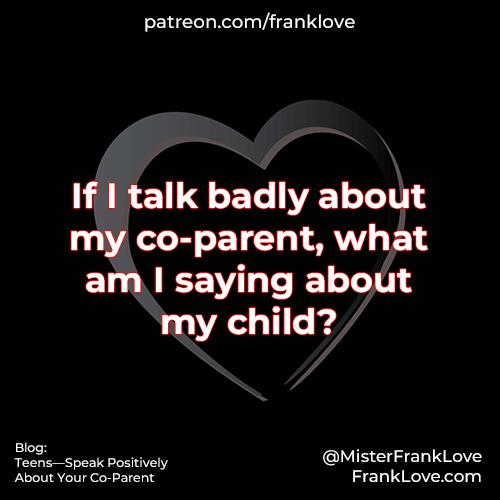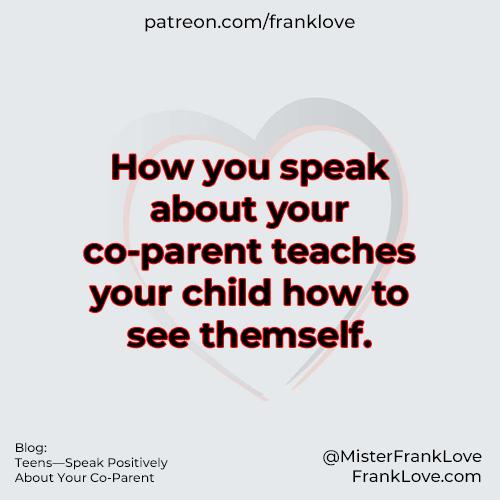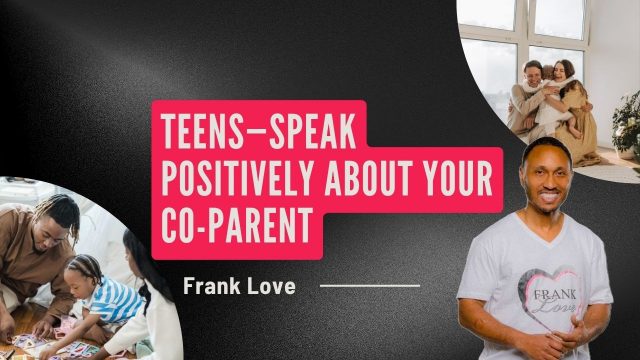 Even if your parents set a bad example, you have the ability to choose how you will parent your own children.
Even if your parents set a bad example, you have the ability to choose how you will parent your own children.
In my previous post, “Teens—Don’t Involve Your Children in Your Disagreements,” we discussed how teens are capable of breaking cycles of inappropriate parental behavior and safeguarding their children’s emotional well-being.
Teens, let’s talk about something that isn’t often mentioned but can have a significant impact on your future: how one day you will talk about your co-parent in front of your children.
This is an appeal to who you may become in the years ahead. It might not seem like a big deal now. Maybe your parents argue and disrespect each other. And it may seem justified. Maybe one of them hasn’t always showed up the way the other needed or wanted. Maybe you’ve even seen other parents speak poorly about their co-parents, and it just seems normal. But words matter . . . more than you may realize. Keep this in mind as you prepare yourself for parenthood.
When you become a parent, please remember that each of your child’s parents are biologically 50 percent of who they are. Half of their genes, their story, and their history comes from each parent. When anyone speaks negatively about a child’s parent, they are also speaking negatively about the child. This is especially true when one parent speaks negatively about the other.
This isn’t about defending everything parents have done or pretending they’re perfect. It’s about protecting your children. How you talk about their other parent affects how they see themselves, you, and your co-parent.
Words Can Build or Break Identity
When you talk down about your co-parent, it might feel like you’re just venting your feelings. But those words don’t just go out into the air, they also go inward. They can quietly shape how our children view their identity, their worth, and even their future.
If your child constantly hears that one of their parents is “lazy,” “selfish,” or “a bad person,” they might start to wonder, Does that mean I am too? They might not say it, but it can sit in their mind and help them doubt themself. Doubt that can become shame, confusion, and self-directed anger.
Every child carries the stories, spirit, and qualities of both parents. When either is torn down, a part of their foundation goes with it. However, when we choose to speak with respect, or at least stay neutral, we protect our child’s sense of self and help to keep it strong. That’s a step toward building our offspring’s confidence.
Being Honest Without Being Hurtful
This doesn’t mean you will have to pretend your co-parent has never made a mistake. We all make mistakes. It’s okay to say your co-parent isn’t perfect. That’s part of healing. But we don’t have to give those mistakes details and body.
There’s a big difference between acknowledging someone else’s humanity and trashing someone’s name. One plants the seeds of understanding and growth. The other plants the seeds of bitterness.
Choosing Silence or Positivity
In your future adult life, if you can’t find anything good to say about your co-parent, that’s okay. You don’t have to fake compliments or pretend you don’t feel what you feel. But you can choose silence over negativity.
Silence is powerful. It can be a sign of maturity. It can mean you are protecting your child and their sense of self. It can mean you are refusing to burden your child with a poor understanding of their other parent, and possibly themselves.
Ironically, over time, you might start to see small things about your co-parent that you can speak positively about. A talent they have, a passion, a story, or just the simple fact that without them you wouldn’t have a child.
Protecting Your Heart and Your Future
When you choose to speak respectfully about your co-parent—or to not speak negatively about them—you send yourself a powerful message: My child is worthy of my full consideration, love, and respect.
That mindset will also support your personal growth. It will help you build healthier friendships, stronger relationships, and a clearer sense of who you are. It reminds you that your identity isn’t defined by anyone else’s behavior, even your parents’ behavior; it’s defined by how you choose to carry yourself.
Your voice is powerful. Use it to build, not break. In your adult future, speak in a way that honors all of who you are and all of who your child is too.
Want More Conversations Like This?
Sign up to receive my weekly Creating a Loving Culture in Our Relationships blog. If this message spoke to you, like, comment, share, and subscribe.
And if you’d like to support this work, you can join the movement at Patreon.com/FrankLove.
Let’s keep creating a loving culture in our relationships, starting with the way we speak about the people we created life with.
In my next blog, “Policing People Who Police Themselves,” I will discuss how letting go of unhealthy and unnecessary conversations and deepen your relationships.
Keep Rising,
Frank Love
Creating a Loving Culture in Our Relationships
Watch my video Teens—Speak Positively About Your Co-Parent Related to this blog.


